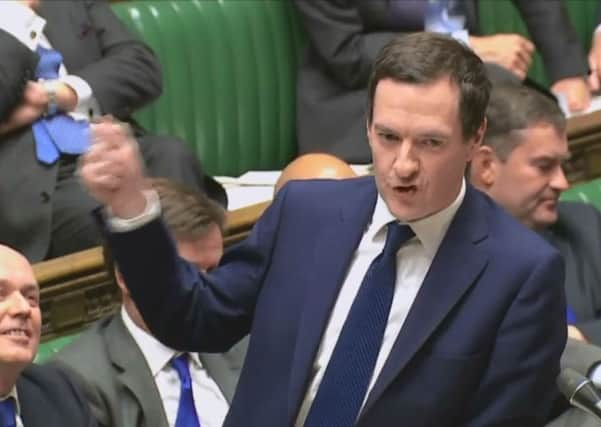Leaders: Osborne acted on political calculation


Thinking about it, it should really have come as no surprise that Chancellor George Osborne has announced further austerity cuts; we all knew they were likely. In fact, Mr Osborne himself acknowledged the self-inflicted difficulties that he would have in hitting his cost reduction targets when the Tories had, as a major plank of their election strategy, a pledge that there would be no rises in income tax or VAT in the life of this parliament.
But the timing of these revelations yesterday was surprising. Yesterday Mr Osborne revealed the government’s remaining 30 per cent stake in the Royal Mail is to be sold, from which it will gain £1.5 billion, and a £3bn cut from government spending this year.
Advertisement
Hide AdAdvertisement
Hide AdThat is £3bn more than the cuts that were announced before the election.
We know that to clear the deficit by 2018-19, as promised, he needs to find a further £30bn of savings over the next three years, including £12bn to come out of welfare spending – exactly where we still don’t know – and £13bn from cuts to government departments.
It is to be questioned why Mr Osborne thought he had to move now, especially as he has a mini budget in the offing next month. He says this is because it will smooth out the ride over the coming months and years by starting early. But is a month so crucial economically speaking?
Some analysts have pointed to growth in the private sector making it now better able to pick up the slack, but that does not seem to be a fast-moving phenomenon. Perhaps the answer lies in politics, not economics.
Given the wafer thin majority the Tories enjoy it may be that the political decision is to get the difficult stuff out of the way as soon as possible, because governments with small majorities might not have to wait long before the defeats roll in. Or it could be that there is so much bad news coming in July’s budget that it was thought prudent to start getting it out now.
As a side issue, the SNP has criticised the sell off of the government’s remaining share of the Royal Mail, saying that such a move poses a danger to the universal service obligation, pointing out that Scotland does rely on this more than other parts of the country.
The SNP says that “a privatised postal service will undoubtedly put pressure on government to reduce the terms of the universal service obligation… leading to a reduced service in rural and less affluent areas.”
But the fact of the matter is that the government only holds a minority stake in what is already a private company, and the obligation is easy to enforce with effective penalties set into detailed contractual agreements.
Poor response for custody death family
Advertisement
Hide AdAdvertisement
Hide AdIt IS shameful that the family of Sheku Bayoh, who died in Kirkcaldy last month following a police incident during which a female officer was hospitalised, should have had to wait a month before nine officers have agreed to give statements to the Police Investigations and Review Commissioner.
The investigators have no statutory power to compel police officers or police staff to give evidence.
Surely it is the interests of all to get to the facts of what happened, not just the grieving family. Even if the officers did feel that they could not freely make statements unless they were told that they were being treated as witnesses, surely such assurances should have been given before now, if that is what was holding up the investigation.
There can be no escaping the fact that such delays send a signal that the interests of the family and other loved ones and consideration for their welfare is not at the forefront of the minds of the police. In such cases it must always be incumbent upon the state and state agencies to ensure the public are treated with respect and decency and that the state must be seen to be doing everything it can.
In England, the Independent Police Complaints Commission (IPCC) was given new powers in 2012 to compel police officers as witnesses. The move was designed to aid the investigation into the police’s response to the Hillsborough disaster.
It would seem that there is a leaf that Scotland could take from England’s book that would be seen as evidence of putting the public first.